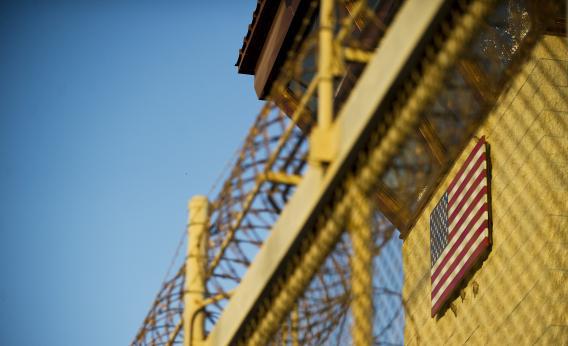When Barack Obama took office, he banned torture, shut down the CIA’s network of black-site prisons and pledged to close Guantanamo. But exactly where terror suspects should go continues to be a legal and political challenge for the administration. So ProPublica rounded up some of the best reporting on rendition and detention under Obama. Got others? Add them in the comments.
Why Obama Hasn’t Closed Guantanamo Camps, Foreign Affairs, January 2012
Miami Herald’s Guantanamo reporter Carol Rosenberg analyzes the combination of political, security, and bureaucratic obstacles that have thwarted Obama’s plans to shut down the prison. ProPublica has also covered the dilemma of indefinite detention at Guantanamo.
Terror Suspect Secretly Held for Two Months, Los Angeles Times, July 2011
Ahmed Warsame was the first known terror suspect to be held by the Obama administration outside the legal system, on a Navy ship. Administration officials said Warsame was interrogated “humanely” and not by the CIA. Wired’s Danger Room confirmed the ship where Warsame was held, calling it the administration’s floating alternative to Guantanamo.
Iraq and Afghanistan
Secret Prison Revealed in Baghdad, Los Angeles Times, April 2010
In a secret prison in Baghdad, hundreds of Sunnis were allegedly held and tortured under the jurisdiction of Iraqi prime minister Nouri Maliki’s military office. About a year later, a second secret prison was uncovered in the Green Zone, raising concerns about human rights abuses as the United States diminishes its role in Iraq.
U.S. had advance warning of abuse at Afghan prisons, officials say, Washington Post, October 2011
Were CIA officials aware of torture inside Afghan prisons prior to a United Nations investigation? This piece explores whether U.S. officials failed to act on early evidence of detainee abuse at facilities run by an Afghan intelligence force funded by the United States.
Two Afghans Allege Abuse at U.S. Site Washington Post, and Afghans Detail Detention in “Black Jail” at U.S. Base, New York Times, November 2009
Some of the first revelations about U.S. Joint Special Operations Command secret jail at Bagram Air Force Base emerged from these interviews with Afghans who said they had been held for months, and in some cases beaten. A few months later, the Red Cross confirmed the site to the BBC, but the United States continued to deny its existence.
Afghanistan Secret Prisons Confirmed by U.S., Associated Press, April 2011
The Pentagon confirms a network of secret “temporary” detention centers in Afghanistan, but former detainees claim they were held weeks at a time. The AP also reports new details about JSOC’s secret jail at Bagram, where, according to human rights groups, detainees were forced to strip naked and kept in solitary confinement in windowless cells.
Detainees Are Handed Over to Afghans, but Not Out of Americans’ Reach, New York Times, May 2012
As detainees are transferred from Bagram to new, nominally Afghan-controlled prisons, Americans still have de facto control over their fate, as “no detainee can be released unless the Afghans consult with the Americans and consider their views favorably.”
Reports of Proxy Detention, Mother Jones, The Nation, and the New York Times
Several individuals who were detained overseas and held by local security forces under harsh conditions allege U.S. officials were complicit in their arrests. This April, Mother Jones wrote about a Muslim American man who claims he was interrogated and beaten by local police in the United Arab Emirates. He claims the questions were “eerily similar” to those asked by American officials when he was earlier interrogated in Sudan. In March 2010, The Nation chronicled the experience of a Lebanese man and naturalized U.S. citizen questioned by UAE officials in the suspected presence of an American interrogator. In January 2011, the New York Times reported on a Somali-American teenager who claims he was held in a Kuwaiti detention cell and interrogated about contacts with terrorist suspects in Yemen. He said he was visited by American officials while in detention. In each case, the U.S. has denied comment.
The CIA’s Secret Sites in Somalia, The Nation, July 2011
This report describes a secret CIA counter-terrorism training facility and an underground prison in Mogadishu. While the prison is run by the Somali National Security Agency, former prisoners and Somali officials say the CIA regularly conducts interrogations there and keeps local intelligence workers on the payroll.
Somalia’s Prisons: the War on Terror’s Latest Front, Daily Beast, June 2012
The United States acknowledged it has a military presence in Somalia just last month. The warden at an overcrowded Somali prison says the Americans have sent him 16 prisoners since 2009. A Pentagon spokesman says only that the United States has handed prisoners “back over to where they came from.”
